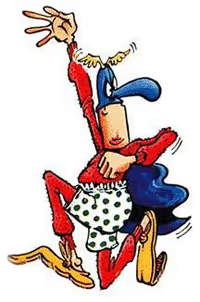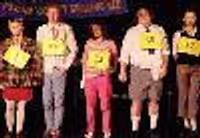Falsettos Revival in 2016!
#50Falsettos Revival in 2016!
Posted: 2/6/15 at 11:35am
The first part (March of the Falsettos) was about relationships. Finn was pushed to create an "ending" to that show and he wrote Falsettoland. However, Falsettoland became less about relationships and more about social issues.
Personally, I felt it continued the theme of relationships, redefining the dated concept of "family", and expanded on this with how social issues affected these relationships. To me, Falsettoland was never "about AIDS" (which is probably why I liked it for the reasons Namo didn't). There was a lot of material from the LGBT community covering that and though AIDS played a part in the show, I don't think it was intended to be THE centerpiece or a source of education on the subject. It was a catalyst to the plot and it played a major part in the lives of these people and their relationships to one another.
I think relationships are still very much the center of Falsettoland- there's actually very little critique about how the early days of HIV/AIDS were handled.
I agree. The stuff Goth mentioned is actually a small section in the show. Yes, the doctor is there to introduce the subject and convey the confusion and frustration in its early days, but it's not the only reason she exists. Otherwise, her girlfriend would not be in the show. It's another relationship linked to the central character of Marvin also affected by these events. I think Unlikely Lovers was a beautiful and poignant number that highlights the true intended theme of the show, further underlined by What Would I Do.
Gothampc
Broadway Legend Joined: 5/20/03
#51Falsettos Revival in 2016!
Posted: 2/6/15 at 12:01pm
"Personally, I felt it continued the theme of relationships, redefining the dated concept of "family".
But it doesn't. The action centers around Marvin which you've pointed out. A man leaves his wife and child for another man, who then dies of AIDS leaving him alone. And the last line in the show "Welcome to falsettoland." Is that redefining the dated concept of family?
Do you understand that this musical can be misunderstood to mean "Gay male relationships are toxic and end up with someone dying of AIDS?" The wife and child don't suffer, the lesbians don't suffer, only the tortured Friend of Judy suffers.
#52Falsettos Revival in 2016!
Posted: 2/6/15 at 12:26pmIsn't the last image in the show literally Marvin surrounded by his friends and family?
#53Falsettos Revival in 2016!
Posted: 2/6/15 at 12:46pm
^
Precisely. Trina's change in attitude, Jason's solution to the bar mitzvah, the bar mitzvah scene, Unlikely Lovers, the final tableau...it's all about relationships and family. Falsettoland IS their family. And the family includes ALL of them. Welcome to Falsettoland.
Do you understand that this musical can be misunderstood to mean "Gay male relationships are toxic and end up with someone dying of AIDS?" The wife and child don't suffer, the lesbians don't suffer, only the tortured Friend of Judy suffers.
Everything could be "misunderstood" for a variety of reasons. That is all part of the subjective experience and what we choose to take away from it. If that's all someone gets from this show, then that's all they chose to focus on and interpret from it. Do you understand that? If you assume none of the other characters suffer, then you haven't paid attention to most of the show. Just because scenes of actual emotional suffering are not explicitly portrayed on stage does not mean that it isn't implied or was purposely meant to not exist. It's such a ridiculously narrow-minded tunnel-vision fundamentalist approach to the show, I'm actually surprised it came from someone who prefers the far less literal In Trousers.
It reminds me about the idiots who would say Rent was only about lazy kids whining about not getting a free apartment.
#54Falsettos Revival in 2016!
Posted: 2/6/15 at 1:17pmI would say Trina suffers a great deal in March of the Falsettos, even if she ends up marrying Mendel.
Gothampc
Broadway Legend Joined: 5/20/03
#55Falsettos Revival in 2016!
Posted: 2/6/15 at 1:26pm
"I would say Trina suffers a great deal in March of the Falsettos, even if she ends up marrying Mendel."
Which out of all the great songs they could have pulled from In Trousers, they chose to have her sing the insipid "I'm Breaking Down" while holding a banana to represent a limp penis.
#56Falsettos Revival in 2016!
Posted: 2/6/15 at 1:41pmDays Like This is quite literally showing the entire family coping with in their various ways. Holding to the Ground is Trina, "trying not to care about this man that Marvin loves. But that's my life...he shared my life." This is indeed affecting all of the characters. And I found a great deal to relate to in their plight, despite not having any gay family members or knowing anyone with AIDS.
#57Falsettos Revival in 2016!
Posted: 2/6/15 at 1:50pmYay! Falsettos was the first show I ever saw on Broadway. Summer of 1992. John Golden theatre. I sat in the balcony with a half-price ticket from the TKTS.
#58Falsettos Revival in 2016!
Posted: 2/6/15 at 2:09pm
Which out of all the great songs they could have pulled from In Trousers, they chose to have her sing the insipid "I'm Breaking Down" while holding a banana to represent a limp penis.
From the 1985 revision of In Trousers, but yes. It worked brilliantly. I can't think of another number from In Trousers for Trina that would have better defined her character without being redundant or bogging down the first act.
#59Falsettos Revival in 2016!
Posted: 2/6/15 at 8:09pm
IN TROUSERS actually ran for months in LA and I happened to be visiting and saw it. True, the story isn't as linear as the later two acts, but it didn't seem incoherent in the slightest. I enjoyed it very much and I agree with those here who praise the score.
It certainly tells us a lot about Marvin AND Trina that pays off in the next act.
I vote with those who say the trilogy is ultimately about family, not about the early AIDS panic (in the sense the NORMAL HEART is). My now-husband and I took our teenage kids to MARCH. They weren't as moved as we were (Kids!), but they got the point.
Videos





